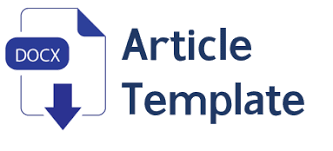Key to Successful Differentiated Learning: Strategies of SKI Teachers in Utilizing Diagnostic Assessment Results at MTs YPI Panjeng Ponorogo
Abstract
One significant framework within the implementation of the Merdeka Curriculum is the concept of differentiated learning, which acknowledges the individual differences among students and provides a tailored learning experience based on their varying needs and interests. This research aims to uncover the success of implementing differentiated learning in MTs YPI Panjeng, Ponorogo, with a specific focus on the role of Sejarah Kebudayaan Islam (SKI) teachers in leveraging diagnostic assessment results. This research employs a qualitative approach, involving in-depth interviews with SKI teachers, classroom observations, and document analysis. The findings of the study indicate that SKI teachers at MTs YPI Panjeng have developed various effective strategies to utilize diagnostic assessment results as a foundation for differentiated learning. These strategies encompass identifying individual student needs, grouping students for learning, utilizing diverse instructional materials and media, and implementing ongoing formative and summative assessments. Furthermore, the study identifies several supportive factors contributing to the successful implementation of differentiated learning, including teacher commitment, school leadership support, and collaborative efforts among teachers. These findings offer valuable insights for the development of differentiated learning approaches in MTs and similar educational institutions. The outcomes of this research contribute to an improved understanding of differentiated learning practices in MTs and provide guidance for SKI teachers and educational staff to enhance the effectiveness of differentiated learning. Additionally, this research provides a basis for the development of school policies that support the implementation of differentiated learning at the MTs level.
References
Baruta, Y. (2023). Asesmen Pembelajaran Pada Kurikulum Merdeka: Pendidikan Anak Usia Dini, Pendidikan Dasar, dan Pendidikan Menengah. Pusat Pengembangan Pendidikan dan Penelitian Indonesia.
Boelens, R., Voet, M., & De Wever, B. (2018). The Design of Blended Learning in Response to Student Diversity in Higher Education: Instructors’ Views and Use of Differentiated Instruction in Blended Learning. Computers & Education, 120, 197–212. https://doi.org/10.1016/j.compedu.2018.02.009
Gusteti, M. U., & Neviyarni, N. (2022). Pembelajaran Berdiferensiasi Pada Pembelajaran Matematika di Kurikulum Merdeka. Jurnal Lebesgue : Jurnal Ilmiah Pendidikan Matematika, Matematika Dan Statistika, 3(3), 636–646. https://doi.org/10.46306/lb.v3i3.180
Ismajli, H., & Morina, I. I. (2018). Differentiated Instruction: Understanding and Applying Interactive Strategies to Meet the Needs of all the Students. International Journal of Instruction, 11(3), 207–218.
Kemdikbudristek RI. (2022). Panduan Pembelajaran dan Asesmen Pendidikan Anak Usia Dini, Pendidikan Dasar, dan Menengah. Kemdikbudristek RI.
Khristiani, H., dkk. (2021). Model Pengembangan Pembelajaran Berdiferensiasi (Diferentiated Instruction) Pada Kurikulum Fleksibel Sebagai Wujud Merdeka Belajar di SMPN 20 Kota Tangerang Selatan. Jakarta: Pusat Kurikulum dan Pembelajaran Badan Standar, Kurikulum, dan Asesmen Pendidikan Kementerian Pendidikan, Kebudayaan, Riset, dan Teknologi.
Leuwol, Ferdinand Salomo, et al. (2023) "Inclusive Education Perspectives: Montessori and Vygotsky's Approaches to Creating a Supportive Learning Environment For All Children." Indonesian Journal of Education (INJOE) 3(2), 247-256.
Maki, P. L. (2023). Assessing for Learning. Routledge. https://doi.org/10.4324/9781003443056
Matondang, Z., Djulia, E., Sriadhi, & Simarmata, J. (2019). Evaluasi Hasil Belajar. Yayasan Kita Menulis.
Nasution, S. W. (2022). Assesment Kurikulum Merdeka Belajar Di Sekolah Dasar. Prosiding Pendidikan Dasar, 1(1), 135–142.
Pozas, M., Letzel, V., & Schneider, C. (2020). Teachers and Differentiated Instruction: Exploring Differentiation Practices to Address Student Diversity. Journal of Research in Special Educational Needs, 20(3), 217–230. https://doi.org/10.1111/1471-3802.12481
Prodyanatasari, Arshy, et al. (2023). "Comparison of Educational Theories: Perspectives of Carol Dweck and Howard Gardner in Developing Individual Potential." ANTHOR: Education and Learning Journal 2(6), 725-732.
Rossi, P. H., Lipsey, M. W., & Henry, G. T. (2018). Evaluation: A Systematic Approach. Sage publications.
Sriyanti, I. (2019). Evaluasi Pembelajaran Matematika. Uwais Inspirasi Indonesia.
Tomlinson, C. A. (2001). How to Differentiate Instruction in Mixed-Ability Classrooms. Pearson Education.
Valiandes, S., & Neophytou, L. (2018). Teachers’ Professional Development for Differentiated Instruction in Mixed-ability Classrooms: Investigating the Impact of a Development Program on Teachers’ Professional Learning and on Students’ Achievement. Teacher Development, 22(1), 123–138. https://doi.org/10.1080/13664530.2017.1338196



